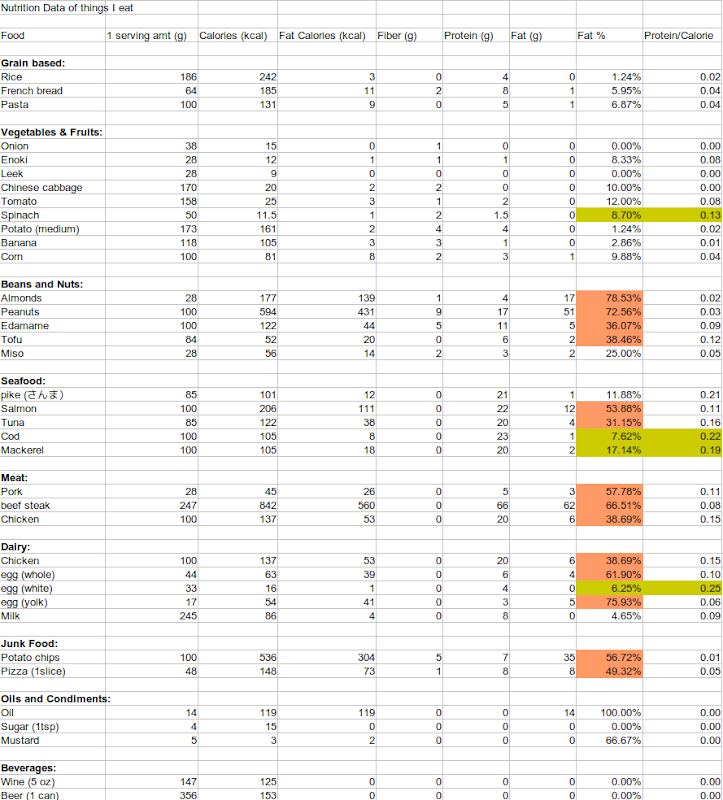I will be following the objects laid out here to aim for about 1 lb/week weight (mainly fat) loss for the first few months. I currently weigh about 152 lbs and will be aiming for a 1600 kcal/day diet.
In point form, the daily diet I will be aiming for is the following (from this webpage):
-Caloric intake: 1600 kcal/day,
-Fat intake: max 10% of caloric intake ~ 160 kcal/day
-Protein intake: ~ 1g protein / lb body weight -> 150 g protein/day
In order to attain this goal, I've started looking into the nutritional values of food to figure out the right combination of foods to attain the above dietary goals. I've started looking at nutritional data provided at nutritionData.com, which is a search able database of many common foods and compiled a short list of foods that I consume on a regular basis.
The optimization problem that needs to be solved here is finding foods that are high protein and low in fat. From what I have found so far is that meats tend to be very high in protein, however also very high in fat content. In general, when trying to lose fast and gain muscle, these are the kinds of foods that you want to avoid, unless you have a high metabolism that allows your body to consume fat calories very quickly.
The nutritional table of foods that I commonly consume is posted below:

A quick glance at the food table here, it is quite easy to acquire calories only by selecting for grain based foods like rice, pasta or bread. Given that there is a degree of freedom in calories, it is necessary to find a way to consume the target amount of protein amount of 150 g without going over the caloric and fat intake budget. To get and idea of the kinds of foods that I would be selecting for, I have also added % fat and protein(g)/calorie(kcal) columns to the the provided table.
Since I am aiming for 150 g protein/1600 kcals for a single day my selection criteria for foods high in protein will be a grams protein/kcals ratio of greater than 0.09 at minimum. The obvious sources for protein is meat but protein from meat tends to be high in fat. The best out of meat group is chicken, with the lowest of fat content at 38.7% and the highest ratio of protein/calories of the meat group.
Doing some quick calculations, basing a diet around chicken for my nutritional goals is impossible if I were to get all of my protein from chicken (consuming 750g/day) would yield about 380 kcals in fat putting me over my fat intake limit. Thus consuming meat is out and I'll leave meat eating to social events.
Looking at the list closely, good sources of protein that are low in fat is seafood, most notably white meat seafoods, including pike, cod and mackerel (salmon and tuna, however is high in fat). The winner of this group is cod with a fat content of 7.6% and a protein/calorie of 0.22. With this fish I could consume 750 g/day for my protein intake and would have plenty of space left in my daily calorie budget to eat anything else (grains and vegetables).
Obviously, I won't be basing my protein needs from a single source but it gives me a good idea of the kinds of foods I need to be consuming to attaining my dietary goals. Oddly enough, for the diet I am looking at, I am quite certain that I won't be eating less, but just as much or even more compared to what I eat now. Which seems somewhat counter intuitive. You just have to eat the right foods to stay lean instead of less.
The focus of this diet will be to move my protein intake to fish and supplement my caloric intake with nutrients from vegetables to keep fat consumption low. I have started taking daily weight measurements to see how things go and will be looking to post preliminary results after taking a month of data.
No comments:
Post a Comment